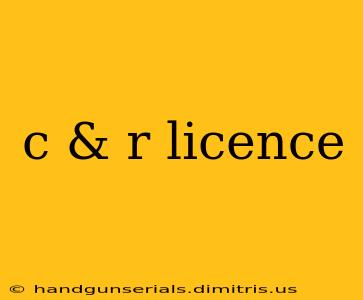Obtaining a C&R license, often referred to as a Curio and Relic license, is a crucial step for collectors and dealers of firearms and firearm parts in the United States. This guide delves into the intricacies of C&R licenses, clarifying their purpose, eligibility requirements, and the responsibilities associated with possessing one.
What is a C&R License?
A C&R license, officially known as a Curio and Relic firearms license, is a federal license issued by the Bureau of Alcohol, Tobacco, Firearms and Explosives (ATF). It permits the purchase of certain firearms and firearm parts, specifically those designated as curios or relics, directly from licensed dealers without the usual background checks required for typical firearm transactions. This significantly simplifies the acquisition process for collectors.
Eligibility Requirements for a C&R License:
To be eligible for a C&R license, applicants must meet several criteria:
- Age: Be at least 21 years old.
- Legal Resident: Be a resident of the United States.
- No Felonies: Have no felony convictions or disqualifying misdemeanor convictions. This is rigorously vetted during the application process.
- Collection Intent: Demonstrate a genuine intent to collect curios and relics. This usually involves possessing a collection or providing evidence of serious collecting intentions.
- Proper Storage: Applicants must possess secure storage facilities for their firearms, meeting ATF standards.
Curios and Relics: Defining the Categories
The ATF defines "curios and relics" as firearms that are:
- Over 50 Years Old: Generally, the firearm must be at least 50 years old at the time of purchase.
- Historical Significance: Or possess significant historical, cultural, or scientific value.
- Inoperable or Non-Functioning: These could be parts or deactivated firearms that are not readily restorable to firing condition. (However, the ATF strictly regulates the ability to restore these.)
- Specific Categories: The ATF maintains a list of specific models and types of firearms that are eligible for C&R status.
The Application Process: Steps to Follow
The application process for a C&R license is detailed and requires meticulous attention to accuracy. Applicants should:
- Complete Form 7: Download and meticulously complete ATF Form 7, the application for a license.
- Gather Supporting Documents: This includes proof of identity, residence, and a detailed description of your firearm collection (if any).
- Submit Application: Send the completed application and supporting documentation to the appropriate ATF office.
- Background Check: Undergo a thorough background check conducted by the ATF.
- License Issuance (or Denial): Upon successful completion of the background check, the ATF will issue the license. Denials are possible if the applicant doesn't meet eligibility criteria.
Responsibilities of C&R License Holders:
Possessing a C&R license comes with responsibilities:
- Accurate Record Keeping: Maintaining meticulous records of all acquired curios and relics is mandatory. This includes details such as the date of purchase, seller's information, and firearm description.
- Secure Storage: Storing firearms securely, in accordance with ATF regulations, is paramount.
- Compliance with Laws: C&R license holders are still subject to all other federal, state, and local firearm laws. Understanding and adhering to these laws is crucial.
Potential Challenges and Considerations:
The C&R licensing process can be complex, and applicants should be prepared for:
- Thorough Scrutiny: The ATF thoroughly reviews each application. Incomplete or inaccurate information can lead to delays or denial.
- Lengthy Processing Times: The processing time for C&R license applications can vary.
- Specific Regulations: The rules surrounding curios and relics are specific, and staying informed about changes is vital.
This guide provides a general overview; always consult the official ATF website and resources for the most current and accurate information. The information provided here is for educational purposes only and does not constitute legal advice. Seek legal counsel if you have specific questions regarding C&R license eligibility or compliance.

